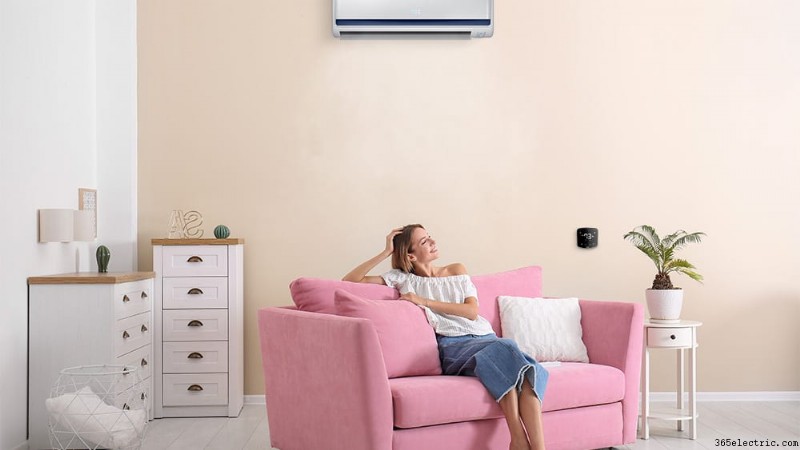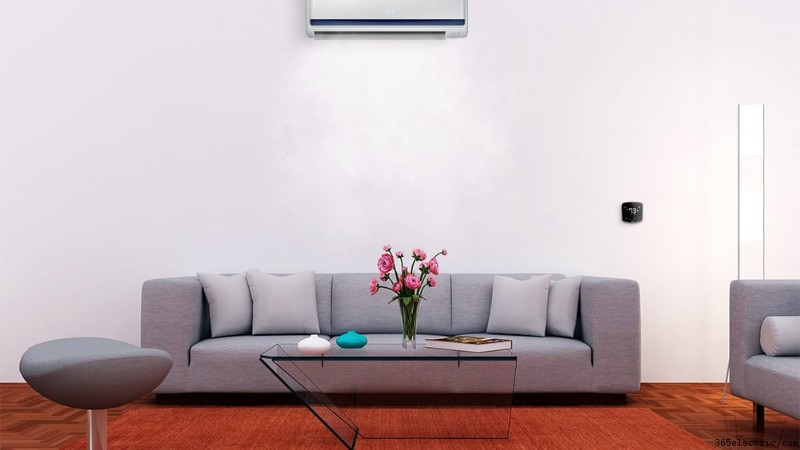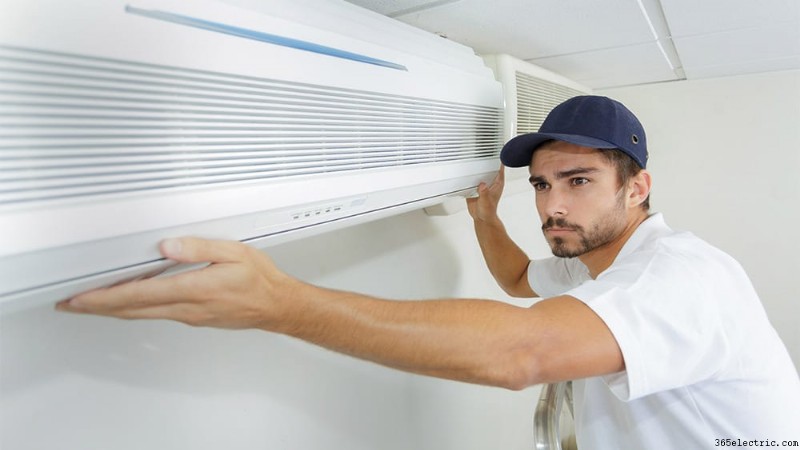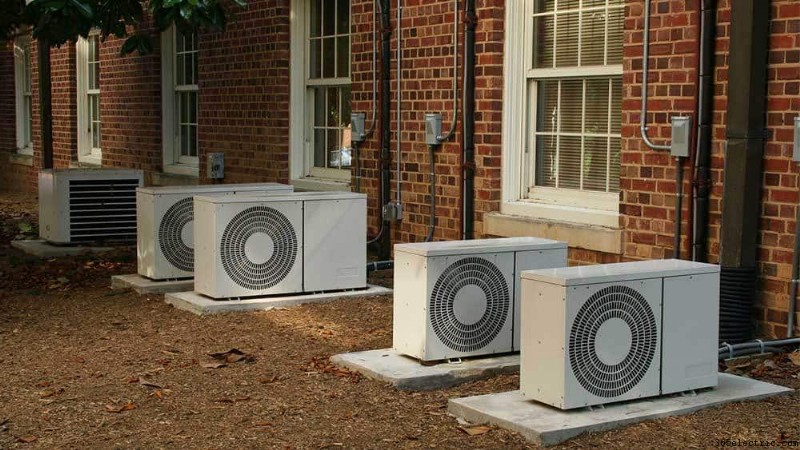Najbolji vodič za kupnju klima uređaja u 2022.

Vruća vrućina ljeti i niske temperature zimi učinile su klimatizacijske uređaje glavnim dijelom u većini domova. Kao rezultat toga, otprilike 87% domova u SAD-u koristi klima uređaj.
Pretpostavimo da ste zainteresirani za nadogradnju svoje postojeće jedinice ili razmišljate o instaliranju dodatnog klima uređaja u svom domu; toplo se preporučuje da napravite domaću zadaću prije donošenja konačne odluke.
Kupnja klima uređaja može biti veliki trošak, stoga biste trebali postaviti neka kritična pitanja kako biste bili sigurni da ste odabrali najbolju dostupnu opciju. Koja je vrsta klima jedinice najprikladnija za veličinu vaše sobe? Trebate pametno grijanje i hlađenje? Koje je najbolje vrijeme za kupnju klima uređaja? Kako odabrati izvođača HVAC?
Na sva ova pitanja pronaći ćete odgovore u ovom vodiču za kupnju klima uređaja koji će vam pomoći da donesete najbolju moguću odluku.
17 stvari koje treba uzeti u obzir pri kupnji klima uređaja
Postoji nekoliko stvari, uključujući veličinu, lokaciju, učinkovitost i više, koje biste trebali uzeti u obzir prije kupnje klima uređaja. Kopajmo dublje i pogledajmo sve važne stvari koje biste trebali znati kada kupujete najbolji klima uređaj za svoju sobu.
1. Vrsta klima uređaja
Postoje različite vrste klimatizacijskih jedinica – od iznimne je važnosti odabrati pravu koja će odgovarati svim vašim potrebama. Sljedeće vrste sobnih klima uređaja najbolje bi odgovarale kao dodatak pojedinačnoj prostoriji.
Prozorski klima uređaji
Ovo su najčešći tipovi klima uređaja. Ako imate mali prostor s odgovarajućim prozorom, odlučite se za prozorske klime. Dolaze u različitim veličinama i prikladni su za manje prostore. Oni su jeftiniji, jednostavni za održavanje i instalaciju. Odlučite se za prozorsku dizalicu topline za cjelogodišnje rješenje za grijanje i hlađenje.
Prijenosni klima uređaji
To su samostojeći podni sustavi koji dolaze s kotačima; možete ih lako pomicati. Osim što hlade prostoriju, oni također odvode vrući zrak kroz lijevak. Iz tog razloga većinu prijenosnih klimatizacijskih uređaja ili toplinskih pumpi treba postaviti blizu prozora kako bi vrući zrak izlazio van.
Dobar su izbor za jednu sobu, ali nisu prikladni za veće sobe ili više soba.
Ductless Mini-Splits
Ako želite rashladiti jednu ili dvije prostorije energetski učinkovitim sustavom, mini-split bez kanala je za vas. Postavljaju se na zid i stoga su poznati i kao zidni klima uređaji. Mini-split paket sastoji se od odvojene unutarnje i vanjske jedinice, koje se jednostavno spajaju kroz mali otvor u zidu.
Postoji više dostupnih opcija, uključujući zidne, podne, jednozonske i višezonske mini-split jedinice.
2. Koja je prava veličina klima uređaja za vaš dom?
HVAC jedinica prevelika za vašu sobu ohladit će se/zagrijati za nekoliko minuta, ali neće moći ukloniti višak vlage iz zraka.
Manja jedinica teško će obavljati svoj posao, što dugoročno utječe na njezino funkcioniranje.
Morate se pobrinuti da kupite jedinicu koja je savršene veličine za vašu sobu jer ne samo da pruža udobnost, već i štedi vaš novac. Odabirom prave veličine možete izbjeći nepotrebne popravke i visoke račune za struju.
Na veličinu vašeg klima uređaja utječu mnogi čimbenici, uključujući razinu vlažnosti, veličinu prostorije, lokaciju vaše sobe, izolaciju zidova, vrste i broj prozora te broj ljudi koji se nalaze u sobi. So, make sure to take into account all the factors to avoid any issues afterward.
3. What Is Your Budget?
When considering buying a new AC, you should set aside a budget. When making a budget, don’t only consider the initial cost but also the cost for installation, operation, and maintenance.
- If you need a larger-sized unit for a large room, it will cost more but will efficiently cool your space.
- An air conditioner with more features will have a higher price. If you opt for a smart air conditioner, the initial price will be higher, but it will pay off with savings and added comfort. Similarly, Energy-Star certified ACs will be costly but will result in more savings on your energy bills.
- Write down both the costs and benefits of your choice of AC unit. If the benefits are not worth the money, consider investing in a better AC model.
- Portable and window air conditioners are considerably cheaper than other options, but their cooling power may also be lower. Though, the wall ACs will have a higher installation cost than window-mounted. Mini-splits are cost-effective if you have to heat or cool larger rooms.
- While portable and window ACs hardly have any installation costs, some mini-split variations can be expensive to install. You can also look into DIY AC models to eliminate AC installation costs.
4. Smart Heating/Cooling

Constantly having to change the temperature can be quite annoying and also mess up your bills. Why don’t you consider investing in smart technology to solve these issues?
You can invest in a smart air conditioner that provides automation, or you can buy a regular AC and make it smart using a separate smart device. Just keep in mind that smart devices offer additional features that you may not get with all smart ACs.
A smart thermostat or a smart AC controller that works with a mini-split air conditioner, window AC and portable heat pump can make your life a lot easier. They go beyond the temperature and humidity regulation. If you forget to turn off AC, no worries, geofencing mode will take care of it. You can also control your AC remotely using your phone.
Moreover, you get notifications about system maintenance like air filter status and even reports about your energy usage.
5. The Location of Your Home
Is your home constantly under the gaze of the hot sun, or do you live in an area surrounded by trees that give a cooling effect? Do you live in a dry environment or a coastal area with high humidity?
Depending on the climate of your area, you might need additional AC features; dry mode, for instance, will be required if you live in a humid area, or Freeze Protection Mode for your vacation rental located in an extreme climate area can be very beneficial.
6. The Structure of Your Room
Do you wish to place an air conditioner in an attic that has slanted walls? Is your window centered on the wall? The structure of your room indicates where a room air conditioner will be placed and what type of AC will be best suited for the place.
Wall-mounted mini-splits go high up on a straight wall, while floor-mounted mini-splits are preferred if you have slanted walls. Window air conditioners, of course, require a suitable window and may not fit in casement or irregular-sized windows. You must measure the height and width of your window to select an AC that will fit. Portable air conditioners are best if other options are unsuitable for your space. While they are easily portable and can fit almost anywhere, their cooling capacity may also be limited.
7. Best Time to Buy an Air Conditioner
Buying an air conditioner during the peak season is never a good idea. When the weather starts to get warmer, the air conditioner sales boom; similarly, when the temperature falls, prices for reversible heat pumps also get high due to an increase in demand.
It’s always recommended to buy an air conditioner during the off-season months that fall in spring and autumn. In spring, it is cool, and many people would not think of turning on the air conditioner. During autumn months, it is not cold enough that people would require heat pumps full time. So, a drop in demand will help you strike a good deal during these two seasons.
8. EER/SEER Rating System
These are rating systems that determine the efficiency of an HVAC unit. The efficiency of your air conditioner is directly related to the electricity cost and the level of comfort.
There are two types of energy efficiency ratings:EER and SEER.
EER is the energy efficiency ratio of cooling energy to the amount of electricity required to power the unit. SEER, on the other hand, is Seasonal Energy Efficiency Ratio. It is also the ratio of cooling power to electricity input energy, but the difference is that it only considers the seasonal usage rather than year-round usage. According to Federal law, the new models should have a SEER of at least 13.
It is essential to take into account these ratings because air conditioning units with higher EER and SEER ratios consume less power, provide better cooling, and are more eco-friendly. These may be more costly initially but result in greater energy-savings.
9. Installation of Your Air Conditioner

Improper installation can cost you a 30% increase in electric bills. Your air conditioning unit needs to be well-fitted for proper functioning.
In the case of window air conditioners, make sure the unit is leveled not to face any drainage issues. Cover any gaps and crevices around your unit as air leakage can affect energy consumption.
In the case of mini-splits, when installing the indoor unit, keep in mind that airflow can get restricted by things like furniture. The outdoor unit should be placed in an area that does not get harsh sunlight and make sure it is properly covered for protection against rain, sun, and heavy winds.
Each type of air conditioner has a specific installation requirement that should never be ignored. You can consult an HVAC expert to get a better idea of your AC requirements.
Make sure you hire an expert trained in installing air conditioners to avoid any major problems afterward.
10. AC Modes/Features
Some air conditioner modes such as vane control, temperature change, fan speed, and other basic modes are a part of every air conditioning unit. However, there are certain special AC modes that you can consider looking for, depending on your needs:
- Heat Mode:Some air conditioners can also provide heat. Opt for a reversible air conditioner or heat pump if you require your unit to cool in the summer and heat during winter.
- Dry Mode:If you live in a humid environment, you should consider buying an air conditioner that comes with this mode. Dry mode removes the excess moisture, reducing the clammy feeling in summers.
- Freeze Protection Mode (FP):In this mode, your AC will run on heat mode to blow warm air into a room. This feature is helpful for homes in extremely cold climates. FP prevents pipes from freezing and bursting. If you go on vacations during winters, consider investing in an AC that supports this mode.
- Energy Saving Mode (Eco Mode):It is a feature that helps you save on bills without compromising on your comfort. This feature causes the fan to cycle on and off with the compressor instead of continuously running. This mode reduces the power your air conditioner consumes.
- Self-Clean Mode:This mode prevents the growth of harmful germs by removing moisture inside your unit. By using this mode, you ensure that the air you breathe in is free from pollutants.
- Follow Me Mode:If you hate waiting for an air conditioner to cool/heat the entire room to feel comfortable, this mode is the one you should be looking for. The follow-me AC mode directs the airflow towards you, making you feel comfortable in no time. In some ACs, it allows your remote to act as a thermostat.
11. An Energy-Efficient Inverter Technology
For better cooling/heating and higher efficiency, inverter technology is worth looking for when buying an HVAC unit.
In inverter technology, the compressor does not turn on/off frequently; it just changes the speed to meet the heating/cooling needs. It is a little pricey but consumes 50% less energy than non-inverter air conditioners. This can drastically reduce your electricity costs, saving you money in the long run.
12. Condenser Coils

With much of your focus on your air conditioner’s indoor unit, you are likely to forget that the condenser part or outdoor unit is equally important.
There are two types of condensers coils:
· Aluminum condenser coils
· Copper coils
Aluminum coils do not require high maintenance, but their repair is complicated compared to copper coils if they are damaged or broken. It is best to go for copper condensers to ensure high functionality.
13. Pay Attention to Noise
Paying attention to the AC noise is crucial as it can affect your comfort level. Ideally, the noise range should be under 50 decibels. High AC noises can ruin your sleep and comfortable daytime environment.
14. Selecting an HVAC Contractor
For choosing an HVAC contractor, you have to do some research. Google the local contractors in your area, read reviews, and check those with a good track record. Be wary of contractors whose websites are loaded with 5-star ratings; fake reviews are a real thing.
The job is not done after you have found a contractor. There are a bunch of things that need to be checked before you proceed to buy an air conditioner:
- Always check if the contractor is licensed or not. They should be licensed by the Contractors State License Board. Many claim to be, but actually, they are not, so don’t forget to cross-check.
- If the contractor tries to give you an estimate over the phone, don’t hire that contractor. A professional contractor would never do that; they would always survey your house first.
- Always take the bid in a written form. A verbal bid is a red flag and should be avoided.
15. Your Home Insulation
While home insulation does not directly affect the type of AC you buy, it does influence your cooling! Before purchasing an AC unit, you should check whether your home is properly insulated or not. Gaps under the doors and windows can cause the infiltration of cold/hot air into your home. In this scenario, your AC will have to work harder, which can negatively impact your bills.
It would be best to insulate your doors, windows, ceilings, and floors to keep heat from moving in during the summer and keep heat from moving out during the winter.
The more insulation you provide, the better your air conditioner will function.
16. Regular Maintenance
When buying a new air conditioner, you must commit to its regular maintenance. It will ensure the optimum functionality of your AC and will also help in extending its lifespan.
When selecting an air conditioner, you should speak to your contractor about the maintenance plan. Most professional home service companies have deals on yearly HVAC maintenance.
17. Check the Warranty
Air conditioner’s warranty varies from brand to brand. Always make sure to check the warranty period and what it covers. Some warranties cover most problems of the AC unit, while others only cover specific parts. Some models even offer a lifetime warranty on the compressor – the most expensive part of your AC, so do take that into consideration.
Buying an air conditioner is a big decision as it impacts the overall temperature &the resulting comfort of your home. The best air conditioner for you depends on your budget, the size of your room, and the additional features you require as per your convenience. All the points discussed in this air conditioner buying guide can help you make an informed decision about buying air conditioners in 2021.
Once you know what kind of AC you need for your space, you’re ready to go shopping!
-
Kako odabrati fotoaparat u 2022. (Vodič za najbolju kupnju)
-
Top 8 najboljih zvučnika za bicikle u 2022. Pregled i vodič za kupnju
-
Najbolja prodaja EOFY klima uređaja 2022
-
Najbolje ponude EOFY friteze 2022
- Najbolji zvučnici 2022. – 10 najbolje ocijenjenih recenzija i vodič za kupnju
- Top 10 najboljih 6×8 zvučnika za budžet 2022., recenzije i vodič za kupnju
- Top 8 najboljih vanjskih rock zvučnika 2022. Pregled i vodič za kupnju
- Najbolji vodootporni zvučnici – 6 najbolje ocijenjenih u recenzijama i vodiču za kupnju 2022.
- 10 najboljih zidnih zvučnika na tržištu, recenzije i vodič za kupnju za 2022.
